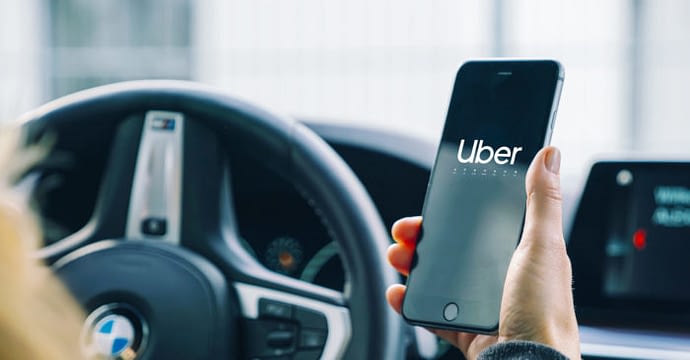latest
Massachusetts Supreme Judicial Court Tosses App-Based Driver Ballot Question

By Colin A. Young
The ballot question involving the status and benefits for app-based drivers will not go before voters this fall and Attorney General Maura Healey was wrong to certify it for the ballot, the Supreme Judicial Court said Tuesday in a ruling that abruptly put the brakes on an expensive and contentious campaign.
The state’s highest court determined that the proposed ballot question (there were technically two slightly different versions) contained “at least two substantively distinct policy decisions,” putting the proposal at odds with the state Constitution’s requirement that initiative petitions contain only related or mutually dependent subjects.
Writing for the SJC, Justice Scott Kafker said that most parts of the initiatives are devoted to defining a new contract-based relationship and benefits between drivers and the “network companies” that they connect consumers to. But, he said, “in vaguely worded provisions placed in a separate section near the end of the laws they propose, the petitions move beyond defining the relationship between app-based drivers and network companies and the associated statutory wages and benefits.”
Beyond the relationship between drivers and platforms, the proposed question would have also altered the relationship between platforms like Uber, Lyft, Instacart and DoorDash and the general public by changing the potential liability a transportation network company would have to someone injured by a driver. Whether the petitions would create a “liability shield” for the platforms was at the center of the oral arguments in the case last month.
“The petitions thus violate the related subjects requirement because they present voters with two substantively distinct policy decisions: one confined for the most part to the contract-based and voluntary relationship between app-based drivers and network companies; the other — couched in confusingly vague and open-ended provisions — apparently seeking to limit the network companies’ liability to third parties injured by app-based drivers’ tortious conduct,” Kafker wrote in the ruling that declares Healey’s certification of the two versions of the question to have been in error.
The SJC’s ruling brings an end to a campaign that pitted deep-pocketed tech companies that collectively spent more than $200 million in 2020 to successfully advocate for a similar measure in California, known as Proposition 22, against Massachusetts labor interests with powerful allies such as U.S. Sen. Elizabeth Warren. Roughly 200,000 workers in Massachusetts drive for rideshare platforms, and companies typically designate them as independent contractors.
Wes McEnany, who led the opposition campaign Massachusetts is Not For Sale, said Massachusetts drivers, passengers and taxpayers can “rest easier” knowing the SJC has struck down the proposed initiative petition.
“The ballot question was written not only as an attempt to reduce the rights of drivers, but also would have put the rights of passengers and the public at risk. The ballot question would have allowed these companies to avoid their most basic responsibilities to provide safe and reliable transportation service. We are excited to continue the work of our coalition to ensure that drivers, riders, and taxpayers are protected from the greed of Big Tech CEOs,” he said. “We commend the court for getting it right on this issue and we will remain vigilant and united against any further attempts by Big Tech to water down worker and consumer protections in Massachusetts or beyond.”
Flexibility and Benefits for Massachusetts Drivers, the industry-backed group that was behind the proposed ballot question, said that a “clear majority” of voters and drivers supported and would have passed the question had it gone to the ballot.
“That’s exactly why opponents resorted to litigation to subvert the democratic process and deny voters the right to make their own decision. The future of these services and the drivers who earn on them is now in jeopardy, and we hope the legislature will stand with the 80% of drivers who want flexibility and to remain independent contractors while having access to new benefits,” a spokesman for the group said in a statement.
When the SJC heard oral arguments in the case last month, the justices zeroed in on the argument that a provision of the initiative that states that drivers will not be considered “an employee or agent for all purposes with respect to his or her relationship with the network company” is meant to shield companies from vicarious liability.
Kafker, who wrote Tuesday’s ruling officially eliminating the question from November’s statewide ballot, was particularly engaged during oral arguments and suggested during the presentation that the initiative intermingled two unrelated issues.
“The public may feel one way about gig employees and how they’re compensated, whether they get all these benefits or not. But the public cares a lot about whether, if they’re in an accident with one of those people, are they limited to suing the poor guy who’s driving the car or can they sue the large corporation that can protect them and cover their damages? Those are two different policy questions,” Kafker said when the SJC heard the case. He echoed those comments in his opinion Tuesday.
Kafker also pointed out in his ruling that the petitions included language instructing that “any party seeking to establish that a person is not an app-based driver bears the burden of proof,” which he said would also make the petitions “go well beyond the contract-based relationship between network companies and app-based drivers, and the compensation and benefits associated therewith.”
Healey’s office, which declared both versions of the question acceptable for the ballot, had contended that “all the provisions of the petitions are germane to this purpose” of defining and regulating the contract-based relationship between network companies and app-based drivers. The AG’s office also disagreed that the language of the petitions would create a so-called liability shield.
But that disagreement over exactly how the petitions’ language would affect lawsuits and the rights of people to bring claims in Massachusetts was cited by Kafker as another reason that the question was not ready to go before voters this fall.
“When even lawyers and judges cannot be sure of the meaning of the contested provisions, it would be unfaithful to [Article] 48’s design to allow the petition to be presented to the voters, with all the attendant risks that voters will be confused and misled,” he wrote, referring to part of the Constitution that deals with initiative petitions.
Lawsuit and Legislation
The evaporation of the ballot question dealing with the classification, pay and benefits of drivers on platforms could make a two-year-old lawsuit that deals with similar themes more significant that it might have been if voters weighed in on the gig economy issues this fall.
In July 2020, Healey sued Uber and Lyft, alleging that the popular platforms were violating Massachusetts labor laws by treating their nearly 200,000 drivers like independent contractors rather than employees and that the companies were pocketing “hundreds of millions” of dollars every year that they should instead be paying in benefits and into state systems.
Healey’s lawsuit seeks a declaratory judgment ordering the companies to comply with the state wage and hour laws, essentially attempting to get the courts to force the companies to comply with the types of state employment laws that their proposed ballot question sought to alter.
The lawsuit remains active and the next scheduled event in the proceedings is a conference planned for July 12, according to court records.
The issues at play in the proposed ballot question are also still alive on Beacon Hill. The Joint Committee on Financial Services has until June 30 to decide how to handle a bill (H 1234) filed by Rep. Mark Cusack of Braintree and Rep. Carlos Gonzalez of Springfield and supported by the industry players who backed the failed ballot question. That bill would establish portable benefit accounts for app-based drivers, but it faced stiff opposition from lawmakers and others who view it as a corporate attempt to render Healey’s lawsuit moot by rewriting state law.






Jake Perry
June 15, 2022 at 6:53 am
“Attorney General Maura Healey was wrong to certify it for the ballot, the Supreme Judicial Court said Tuesday” She CANNOT be our next governor!